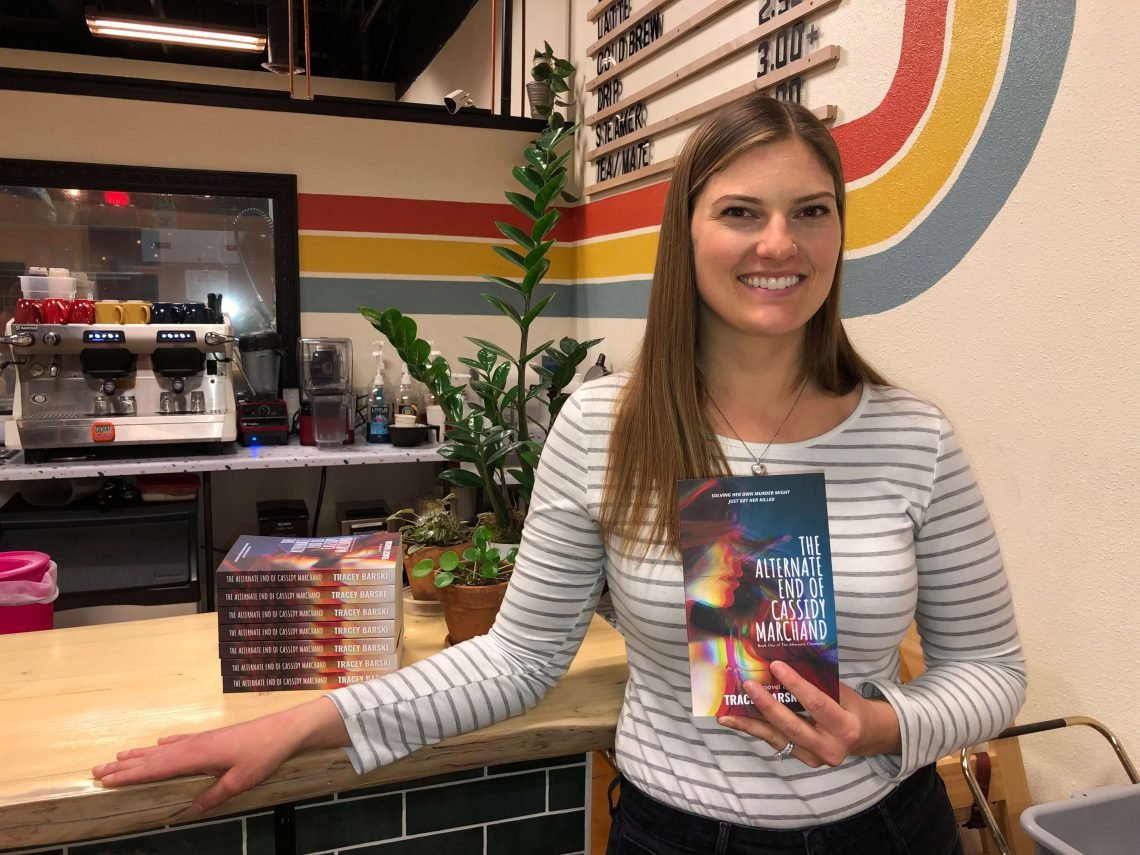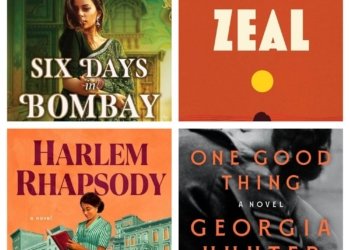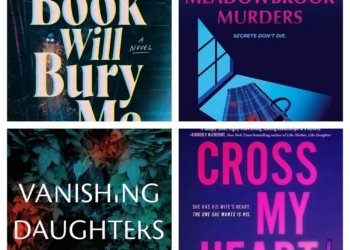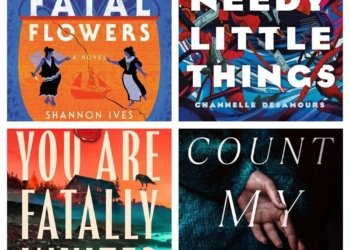No products in the cart.
A Conversation with Tracey Barski, a Romance, Science-Fiction Author
Tracey Barski loves adding elements of multiple genres in her story, providing an immersive experience for her readers. Her latest book contains elements of Mystery, Romance, with a sweet touch of Science-Fiction.
525
SHARES10.4k
VIEWSTracey is a stay-at-home mom who works part-time as an editor and writes books in the evening. She published her first book back in January of 2022 sort of on a whim, after years of being told by friends to pursue publishing.
It has kind of taken off! She currently lives in Colorado with her husband of 11 years and their two young children (5 and 2). She is in process of publishing her second novel in the next couple of months and has started writing the third for this series. “’Bitterness is a slow poison, Cassidy. It won’t kill you, but it will suck you dry until you’re toxic and hollow. And that’s worse than death.’”Tracey Barski, The Alternate End of Cassidy Marchand
Let’s get started with a quick rapid fire.
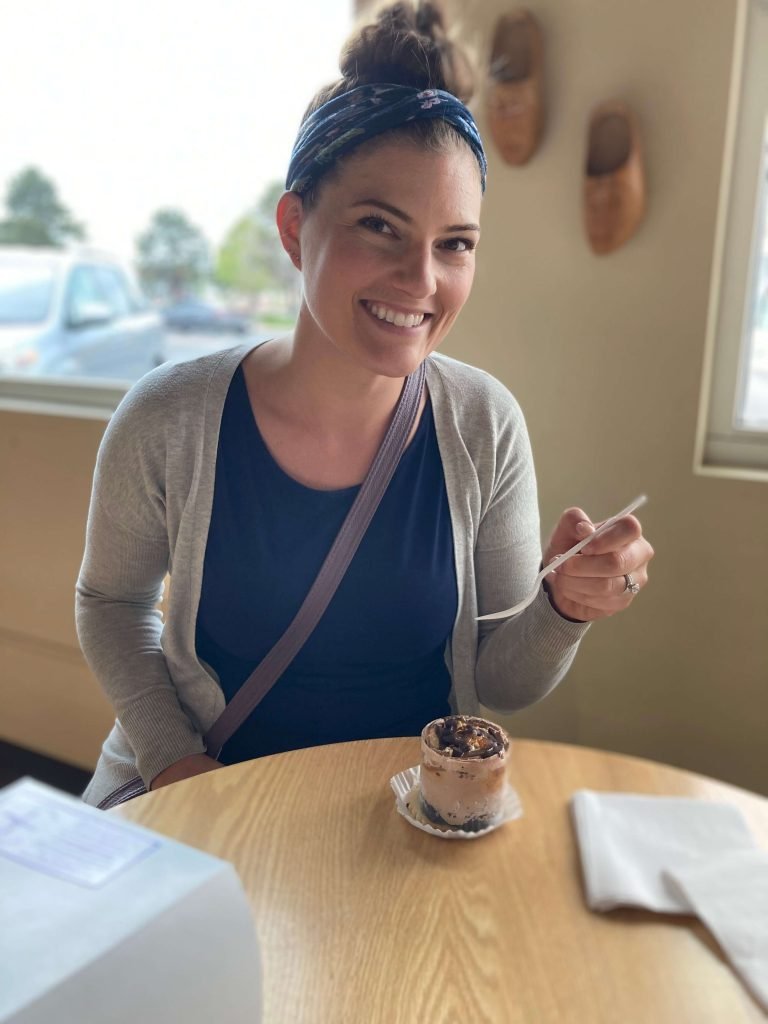
Q1. If you could be transformed into one animal, which one would you choose?
My first thought is cheetah because they’re fast, and I’ve always loved them. But, let’s be honest, I want to be a house cat so I never have to catch my food, and I can sleep in the sun for like 20 hours a day.
Q2. What time do you usually go to bed at night?
Late. My goal is usually 11pm, but I often stay up until midnight or 1am, then hate myself in the morning.
Q3. Are you more of an introvert or an extrovert?
I’m an ambivert, or what I’ve heard called a “social introvert.” I thrive in groups and social settings; I love meeting new people and spending time with others. But I also really crave some alone time on a regular basis. Usually one to two times a week.
Q4. Who is your favorite Disney character?
Maybe Olaf from Frozen. But that could be because I have small children who watch it a lot.
Q5. Would you rather travel to the past or to the future?
Future. Because I can always learn about and even dress up and live like I’m in the past. But I know nothing of the furture, and I’m curious by nature.
Q6. What is your last Google search?
I looked up Minorca, Spain because of a reference in a book. I’m not good at geography and had no idea where Minorca was.
Q7. What object do you misplace or lose the most?
My mind. Then probably my phone.
Q8. What is the kindest thing someone ever did for you?
My daughter was in the hospital on oxygen at 5 weeks old, and a group of people who didn’t really know me set up a meal train for my family so I didn’t have to worry about what was for dinner for two weeks straight.
Q9. Learn by watching or learn by doing?
Definitely doing. “Dark eyes flickered briefly to my face. ‘An alternate version of you? Sounds pretty far-fetched. ‘I snorted. ‘I think the word you’re looking for is “batshit.”‘”Tracey Barski, The Alternate End of Cassidy Marchand
Q10. What is one missed opportunity that you wish you could have a second chance at?
I used to say going to a university I was accepted to in another town. But if I had, my life would be very different. I probably wouldn’t have met my husband, whom I adore.
Q11. What is not a big deal to most people but is torture to you?
Grocery shopping. I absolutely hate it. I do it because I have kids to feed, but when I was single, if I needed food from the store, I opted to skip a meal instead of going.
It’s time for a more detailed conversation, Tracey.
You’ve answered our rapid fire exceedingly well, Tracey. Now, it’s time for our readers to know more about the person behind the book.
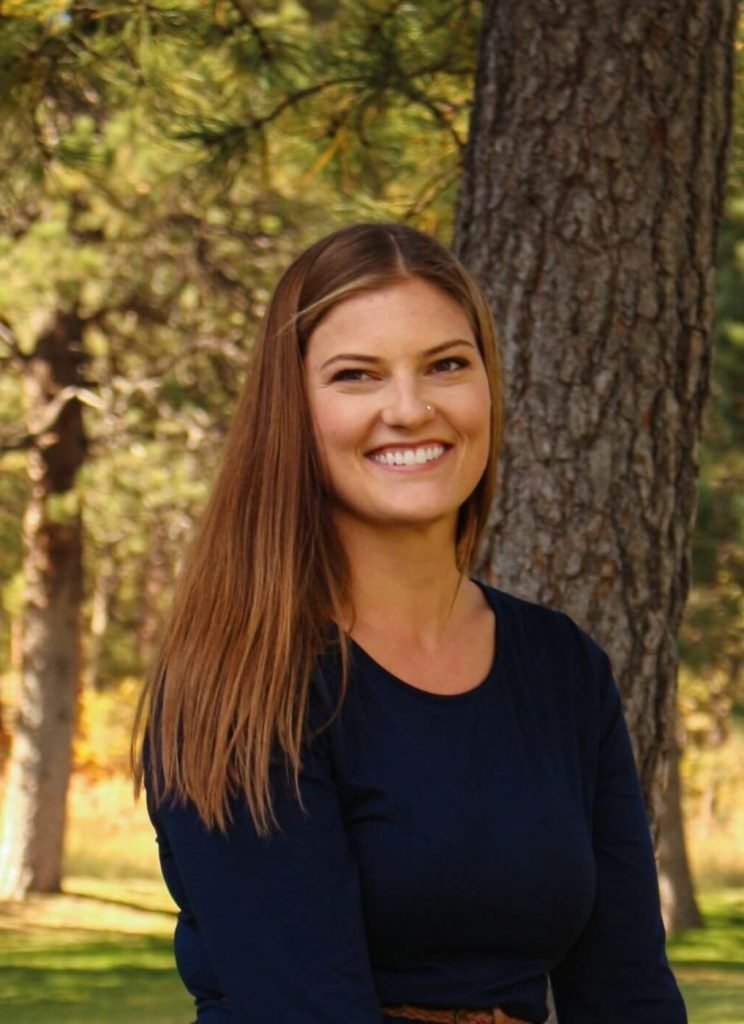
Q. What books did you grow up reading?
Mysteries, mostly. I like the tension of trying to figure out the clues and the little bits of danger involved. It has made me a very analytical consumer of entertainment. My husband hates that I almost always guess correctly what’s going to happen in a movie. He usually shoots me a glare when I say it and then it happens. It is one of my great joys in life.
Q. Interesting. What, to you, are the most important elements of good writing?
I want to experience the life of the character, so if I can get pulled into what is happening around them and what they’re experiencing as a result, that is good writing. A lot of the style is window dressing. But if the story is being told well and the character is likable enough, I can get into it.
Q. Do you hide any secrets in your books that only a few people will find?
Secrets? I’m not sure about that, but maybe I’m so good at hiding my secrets in my writing that I don’t even know about them. I do put elements from my own life in my stories. I like when people who know me well find them. I used a personal memory as a little anecdotal story in my book, and my good friend who was with me for the real event was excited when she read it.
Q. Now comes the most anticipated question that every author must answer. How do you process and deal with negative book reviews?
I read negative reviews of some of my favorite books/authors/movies. Not everything is for everyone. I haven’t gotten a negative review (aside from my brother and his girlfriend not liking my main character, ha). But I know that if someone doesn’t like it, it wasn’t for them. If the negative review is well-written, I’d consider it some constructive feedback. If it’s just mean or vague, or unhelpful, I ignore it. There are plenty of really popular books that I don’t like too. So I have to remind myself that tastes vary from person to person.
Q. What comes first for you — the plot or the characters — and why?
I’m a bit of a pantser, and ideas usually come to me as a character in a scene or with a very vague plot concept. So it’s usually both, I think? But it depends on the story. I rarely have a full plot, regardless.
Q. How do you develop your plot and characters?
With wild abandon. I do it as I go. When I finish a book, my character has fleshed out as the story unfolded. So I will go back to add things throughout for cohesion. I will generally have little ideas of the bigger plot points, but how I get there is quite an adventure. Iw rite for the pleasure of it. If I planned too much, I wouldn’t enjoy the process as much. And, again, I make everything smooth in my subsequent read-throughs.
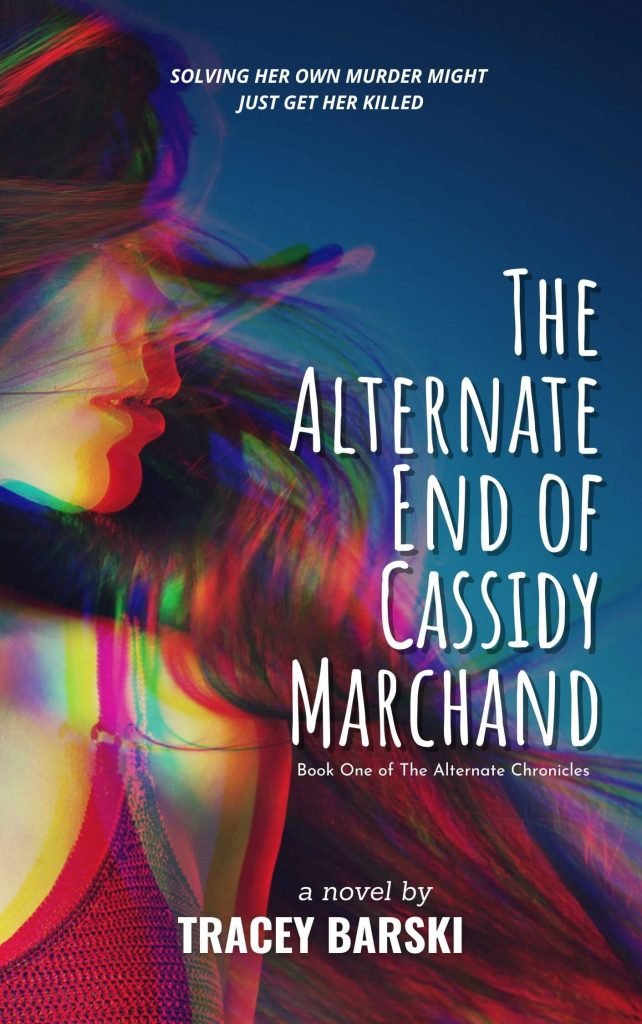
Q. What does literary success look like to you?
Getting your book out to those who will love it. I never set out to sell a bunch of books or make myself famous. I just got joy from sharing my story with people I knew, and I realized there were probably more people out there I didn’t know who would enjoy it too.
Q. Let’s talk about your book. Tell us about it. No major spoilers.
My main character, Cassidy, has basically bveen alone her whole life. She gets arrested for pickpocketing by a local detective. While sitting in jail, she gets transported to an alternate version of her life. She has friends and family, but the kicker is the other version of her has recently been murdered by a serial killer who is still at large. It has the mystery element of figuring out who the killer is but also how she was transported and how to get back. A lot of emotional turmoil and self-discovery happen. There’s a slow-burn romance because I can’t resist.
Q. What part of the book did you have the hardest time writing?
The middle, probably. That’s usually the slowest part because the inciting incident and all those changes have already taken place and the climax of the story hasn’t happened yet. It’s work to make it interesting without too many crazy things happening.
Q. Would you and your main character get along?
Definitely. I think she’s hilarious. She’s also frustrating, but I’m an overly forgiving person.
Q. What are the essential characteristics of a hero you can root for?
Redeeming qualities and a goal you can support. They can have faults, but they have to be likable to an extent. Do they have to be perfect? No. But they can’t just be a straight up jerk or make all stupid decisions all the time. Give and take, realism, etc. No one is all bad or all good. We’re all a little of both, so the hero has to be that way too. And you really need to care about what happens to them and what they’re trying to accomplish.
Q. Let’s talk about the process of writing. When you’re writing an emotional or difficult scene, how do you set the mood?
Sometimes I put on sad music, but I really just go. I am not a super intentional writer as far as prep or environment. If I’m in the flow, it will happen no matter what I do ahead of time. Plus, I don’t plan my emotional scenes ahead of time. They just happen. Further evidence of my propensity for pansting. “I wanted to reach out to him, to offer comfort, but I was rooted to the spot. This was all wrong. This was not my world, and I didn’t know how to reach out to people in pain. I knew how to run. And it was a step that I hadn’t bolted already. To be standing there at all was some kind of miracle.”Tracey Barski, The Alternate End of Cassidy Marchand
Q. What was your hardest scene to write?
Probably the ending scene. I’d come off of the climax, which had gone so fast I barely registered what happened. But I had to wrap things up without dragging it out too much. Some things had to be left unresolved for the next book, so I had to figure out what to tie up and what to leave loose. I still ended up changing it a lot between its first iteration and the final product.
Q. It’s been fun. Now, before we wrap this up, do you have any suggestions to help me become a better writer? If so, what are they?
Read a lot and pay attention to the things the author does that pulls you in or appeals to you. I will sometimes make notes of phrases and descriptions from my favorite authors to try to emulate and work into my writing. Not stealing their exact words, but using it as inspiration to strengthen my own writing.
Her book, The Alternate End of Cassidy Marchand, is available on Amazon in Ebook and Paperback format.
Related Posts
10 Most Anticipated Historical Fiction Novels of 2025
Whether you're looking for a page-turning mystery or a multigenerational epic, these books offer new perspectives on history. Get ready...
100+ Fresh Plot, Characters, and Titles for your next Sci-fi Novel
Welcome, fellow dreamers and storytellers! If you’ve ever found yourself staring at a blank page, yearning for inspiration to strike,...
10 Most Anticipated Thriller Novels of 2025
Are you trying to find a fast-paced thriller that will captivate you from the very first chapter? There are plenty...
8 Most Anticipated Debut Novels of 2025
We've compiled a list of 2025's most anticipated debuts, ranging from heartfelt dramas to terrifying mysteries, each offering unique viewpoints...
About Us

Trenzle
Where Trends are made and discovered
Trenzle is your official source of discovering the latest people, work, and ideas that deserve to trend. Discover Authors and their books, Creators and their work, People and their opinions, and Stories from around the globe.
Learn more
Latest Posts
Trenzle Top 10 Trending Free Book Deals for February 04, 2025
February 4, 2025
10 Most Anticipated Historical Fiction Novels of 2025
February 1, 2025
100+ Fresh Plot, Characters, and Titles for your next Sci-fi Novel
January 31, 2025
Categories
© 2023 Trenzle - Online Author News & Magazine
